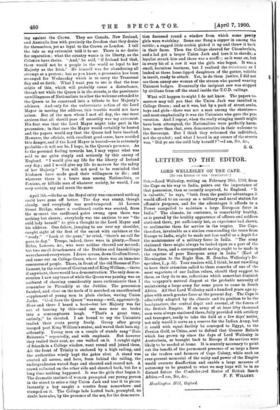LETTERS TO THE EDITOR.
LORD WELLESLEY ON THE CAPE.
[To THE EDITOR OF THE "SPECTATOR."] SIR,—Lord Wellesley, writing on February .28th, 1798, from the Cape on his way to India, points out the importance of that possession, then so recently acquired, to England. " It is valuable," he says, "both from the positive advantages it would afford to an enemy as a military and naval station for offensive purposes, and for the advantages it affords to a Power compelled to maintain a large European force in India." The climate, he continues, is remarkably healthy, as is proved by the healthy appearance of officers and soldiers stationed there, yet sufficiently hot, as experience had shown, to acclimatise them for service in the tropics. The Cape, therefore, invaluable as a station commanding the route from Europe to India, might be made not less useful as a depot for
the maintenance of a military force in India. The army stationed there might always be looked upon as a part of the Indian force, and a correspondent saving ought to be made in the expense of your European army in India " (Earl of Mornington to the Right Hon. H. Dundas, Wellesley's De. spatches, I., p. 32). Your readers will, I think, be not unwilling to have their attention called to these remarks of one of the most sagacious of our Indian rulers, should they suggest to them, as they do to me, reflections which somewhat diminish the taxpayer's natural disgust at the probable necessity of maintaining a large army for some years to come in South Africa. All that Lord Wellesley said a hundred years ago ap- plies with much greater force at the present day. The Cape is admirably adapted by its climate and its position to be the headquarters, the central depUt and arsenal, of the forces of the British Empire. If an army of at least fifty thousand men were always stationed there, fully provided with artillery and transport, ready to take the field at a few days' notice, not only would it serve as a reserve for the Indian Army, but it could with equal- facility be conveyed to Egypt, to the Persian Galf, to China, sent to defend that Greater Britain which has grown up since the days of Lord Wellesley in Australasia, or brought back to Europe if its services were likely to be needed at home. It is scarcely necessary to point out the benefit of the permanent presence of so large a force to the traders and farmers of Cape Colony, while such an ever-present memorial of the unity and power of the Empire would overawe disaffection and enable a large measure of autonomy to be granted to what we may hope will be in no distant future the Confederated States of British South
Africa.—I am, Sir, &c., P. F. WILLURT.
Headington Hill, Oxford.






































 Previous page
Previous page